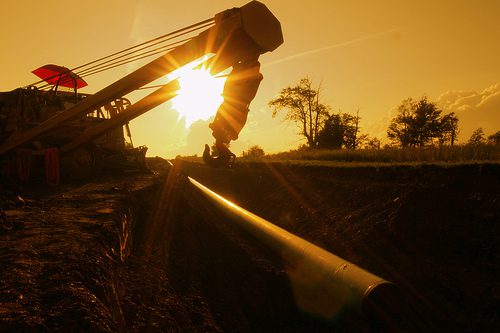By now most people in urban America who pay attention to the news have heard of fracking, the practice of drilling into rock deep beneath the Earth’s surface in search of natural gas. This practice is starting to appear in many parts of the country, including somewhat urbanized places in the Great Plains, but it’s had a particular impact on rural communities in parts of Pennsylvania. The fracking phenomenon has served as a reminder that the raw extraction of wealth from the ground, or from under it, remains a critical source of income for many rural people, despite its potentially destructive impact on the land.
Many parts of rural Virginia, where I live, were shaped historically by a raw extraction economy. First, there was tobacco. Tobacco brought riches to some, but it ruined the soil, so the land was depopulated as people moved west to find better growing conditions. It’s been a struggle economically for many here since then. In some areas, the most significant thing that replaced tobacco was logging. Drive down many a road in this region and you’ll pass at least one clear-cut. Pine plantations are the most common, because pine grows fast, and it’s the first thing to grow from a clear-cut. Someone can make a living from their pine trees within a generation. Try growing oaks or maples, and you’ll be in a casket before the money starts to flow. So that’s why the land has a scarred look – it’s always been that way around here, it’s how people are able to live so far off the metropolitan track. Big development has always passed this region by, but the land can provide.
Until recently, this was a raw materials economy. The logs were cut and shipped out, and the real riches were made elsewhere. People lived small – small houses on big tracts of land. They were rich in raw land, but poor in cash. That’s still true to a significant extent, but with the rise in fuel prices, there’s an opportunity for people here to add value to the wood the land generates. There were always sawmills around, preparing wood for construction or furniture-making. Recently there’s been interest in taking wood and turning it into fuel for stoves, including large ones that are used to provide power on university campuses and other large facilities. In Europe, there’s a voracious market for this stuff. So investors are opening plants in rural areas that are close to the wood source, but not too far from transportation routes to carry the finished product (wood pellets) to big ports like Baltimore or Hampton Roads in Virginia.
What effect will this aspect of the economy have on our area? Possibly it won’t mean a whole lot of change. Many workers here have only a high school education and will continue to be employed in cutting down trees, but not in more skilled roles. As with most manufacturing jobs today, it takes a more advanced education to operate computerized machinery in wood processing plants. There needs to be a shift in education to provide a means for people to get these jobs. Otherwise the jobs will go to outsiders, and money won’t flow to allow local people to improve their housing or other elements of daily living.
Now comes another form of raw extraction to Virginia: uranium mining. The governor has formed a panel to discuss whether to lift a moratorium on this practice, in large part due to a company that wants to mine the stuff in Pittsylvania County. As godawful as the potential consequences of uranium mining seem to many of us, there is a real potential for jobs that has economic development folks salivating.
It seems like as much as one might wish that everyone could get a nice, clean job in nursing, teaching or building houses, there's always going to be a need, and the demand for, work that involves scarring the Earth.
Photo by The Public Herald, CC BY-NC-ND





Comments